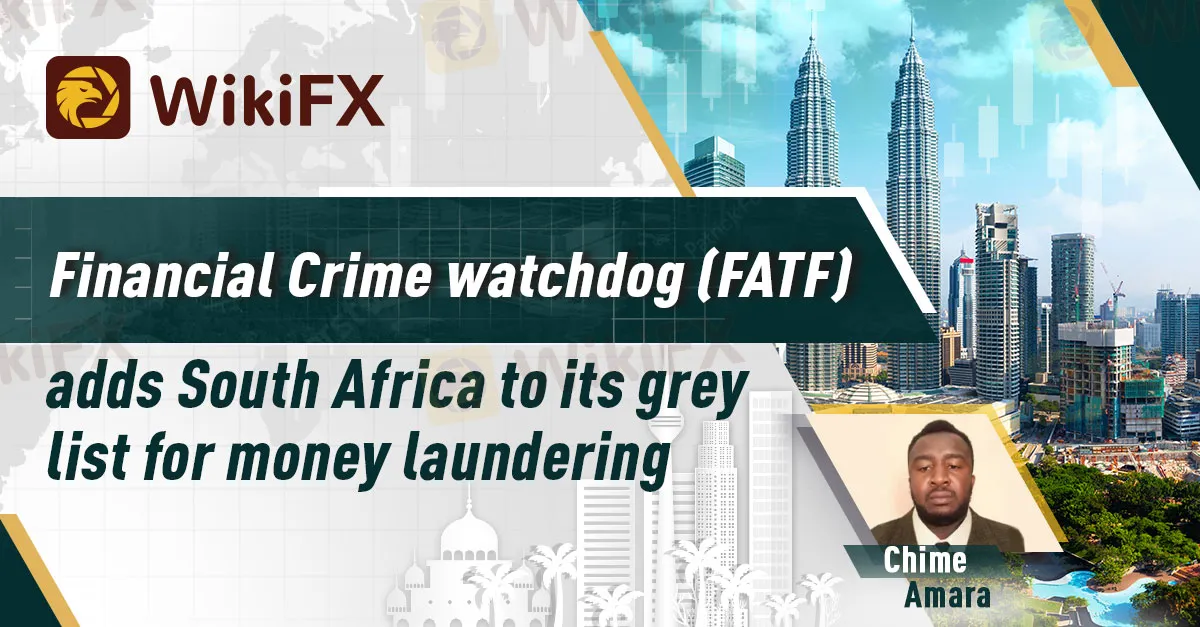简体中文
繁體中文
English
Pусский
日本語
ภาษาไทย
Tiếng Việt
Bahasa Indonesia
Español
हिन्दी
Filippiiniläinen
Français
Deutsch
Português
Türkçe
한국어
العربية
Financial Crime watchdog (FATF) adds South Africa to its grey list for money laundering
Abstract:The Financial Action Task Force (FATF) has added South Africa and Nigeria to its watch list for money laundering.

By: Chime Amara

In a move that has sent shockwaves through the financial industry, the has added South Africa to its grey list for money laundering, alongside Nigeria. The decision was made during a plenary session held by the international watchdog in Paris on February 24, 2023.
The grey list is a warning to countries that their financial systems are not up to scratch when it comes to combating money laundering and terrorist financing. Being on the grey list means that financial institutions operating in South Africa will face increased scrutiny, making it more difficult for them to do business internationally.
This is a blow to South Africa, which has been trying to improve its reputation as a financial hub and attract investment to its struggling economy. It is also a setback for the country's efforts to combat corruption and financial crime.
The FATF stated that South Africa has made progress in implementing its action plan to address the deficiencies in its anti-money laundering and counter-terrorist financing regime. However, the watchdog also noted that more needs to be done to fully address the identified weaknesses.
The South African government has responded to the news by saying that it is committed to working with the FATF to address the issues and to fully implement the necessary measures. The government has also emphasized that it takes the fight against financial crime and corruption very seriously.
The decision by the FATF to put South Africa on its grey list comes at a time when there is increasing global concern about the links between financial crime and terrorism. The international community is increasingly focused on preventing money laundering and terrorist financing, and countries that are seen as not doing enough to combat these threats risk being ostracized by the international financial community.
It remains to be seen what impact this decision will have on South Africa's economy and reputation as a financial center. However, the government will need to take swift action to address the issues identified by the FATF if it is to avoid further damage to its reputation and the wider economy.

Disclaimer:
The views in this article only represent the author's personal views, and do not constitute investment advice on this platform. This platform does not guarantee the accuracy, completeness and timeliness of the information in the article, and will not be liable for any loss caused by the use of or reliance on the information in the article.
Read more

Common Tactics Used in Online Trading Fraud Today
Know the top online trading scams of 2025, from fake apps to pump-and-dump tricks. Simple tips to spot and avoid them, keeping your money safe in this easy guide.

U.S. March ISM Manufacturing PMI Released
The U.S. March ISM Manufacturing PMI data shows that manufacturing has contracted for the first time, and investors should pay attention to future changes and impacts on the sector.

Breaking News! Forex Inflows Surge to $17 Billion
Nigeria's foreign exchange inflows saw a significant increase in the fourth quarter of 2024, reaching $17.39 billion. This growth reflects strong foreign investments and export revenues, bringing new confidence to the market.

Should You Beware of Forex Trading Gurus?
Know the reality behind forex trading gurus, examining their deceptive tactics, inflated promises, and the risks associated with trusting them for financial advice.
WikiFX Broker
Latest News
Exposing the Top 5 Scam Brokers of March 2025: A Closer Look by WikiFX
Gold Prices Climb Again – Have Investors Seized the Opportunity?
Webull Launches SMSF Investment Platform with Zero Fees
Australian Regulator Warns of Money Laundering and Fraud Risks in Crypto ATMs
FCA Warns Against 10 Unlicensed or Clone Firms
CySEC Warns Against 14 Unlicensed Investment Websites
Top Currency Pairs to Watch for Profit This Week - March 31, 2025
Will natural disasters have an impact on the forex market?
Philippines Deports 29 Indonesians Linked to Online Scam Syndicate in Manila
The Withdrawal Trap: How Scam Brokers Lure Victims into Paying More
Currency Calculator







